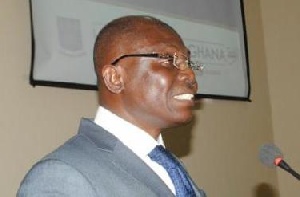 Prof. Felix Asante, Director at ISSER
Prof. Felix Asante, Director at ISSER
The Institute of Statistical, Social and Economic Research (ISSER) has warned that the country’s medium-term growth target of 3.5 percent could be missed if government fails to stop borrowing above its debt sustainability ratio.
The research-based think-tank argues the current economic dispensation demands of government the firm will to curtail the negative practice as well as strive to bridge the yawning expenditure to revenue gap to avoid dire repercussions on the economy.
ISSER, in its 2014 economic performance and outlook report, has rather tasked government to increase efforts at expanding the tax base instead of over-taxing; invest heavily in productive infrastructure; and prioritise non-traditional exports.
Director of the institute Prof. Felix Asante said: “Government expenditure remains the main culprit for the recent huge fiscal deficit to the economy, and this should be reined in over the short- to medium-term.
“The urgent need for prudent management of government resources looms large, and so does the dire need for massive investment in productive infrastructure as well as the prioritisation of exports.”
ISSER’s ‘State of the Ghanaian Economy Report’ sees the wobbly economic situation, especially on the fiscal front, remaining unchanged in the last quarter of this year and into 2016.
“The outlook for 2015 remains bleak, as inflation and interest rates are likely to rise while the global commodity price-fall continues to pose a threat to the country’s economic recovery agenda.”
According to ISSER, Ghana’s economic growth has been resilient in the face of the global recession, even though the rate has been declining since 2011.
The economy recorded a negative outturn in 2014, growing by 4.2 percent -- which is short of the targetted rate of 7.1 percent and makes it the second-highest since 2008.
Data from the International Monetary Fund (IMF) shows that government’s total revenue, comprising tax and non-tax revenue, as a percentage of GDP increased from 16 percent in 2013 to 17.7 percent in 2014.
Meanwhile, total expenditure increased from 27.3 percent to 28.2 percent during the same periods under review.
Since 2011 the country’s growth has been buoyed by oil exports, but the situation was different in 2014 due to the sharp decline in price of the global commodity.
Prof. Asante said these developments, in the face of the shaky outlook, demand of government a firm will to improve macroeconomic management through bold efforts to reduce budget imbalances.
He added: “The country’s development strategy, going forward, should focus strongly on policies of inclusive growth with the objective of ensuring sustainable economic growth and human development.
“Government will have to pursue an employment-centred economic growth direction, as this will force employment to expand along with production and ensure that benefits of growth will be widely shared through better job opportunities and enhanced incomes.”